'German' ANTI-VAXXERS Fleeing to Paraguay Like Their Ancestors Did 70 Yrs.Ago
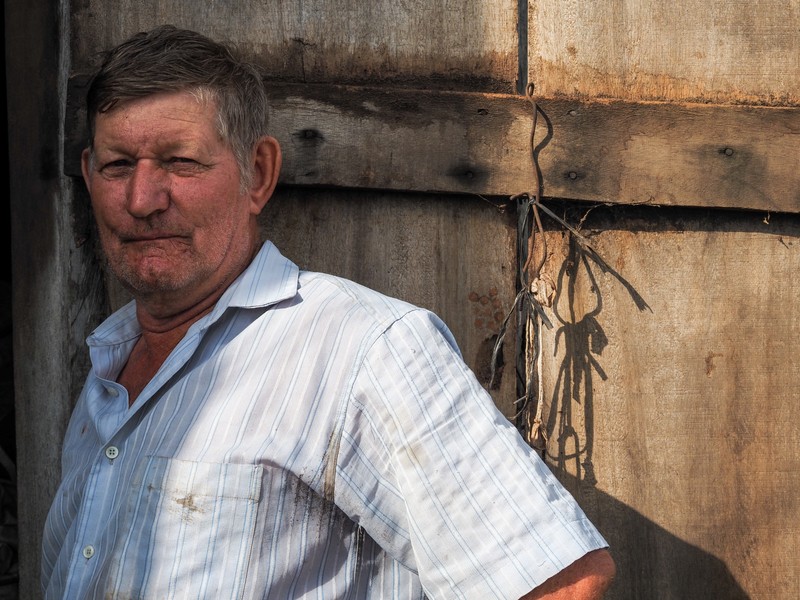 |
| IN THE FAILED 19TH CENTURY ARYAN COLONY OF NUEVA GERMANIA, ITS OFTEN BLUE-EYED DESCENDANTS MIX GERMAN WITH INDIGENOUS GUARANI WHEN SPEAKING. PHOTO: NATHANIEL JANOWITZ FOR VICE WORLD NEWS |
A failed Aryan colony, runaway Nazis, and loose coronavirus regulations have led to a flood of European anti-vaxxers arriving in the South American nation.
VICE
NUEVA GERMANIA, Paraguay — Deep in hot, rural Paraguay lies a gated compound, its front gates protected by intimidating armed guards. Few people other than its 300 residents and the local workers ever enter or leave the isolated hamlet, amid the clay-colored dirt roads and a smattering of local farmhouses that dot the countryside. Paraiso Verde—or Green Paradise—isn’t an exclusive vacation resort or rehab clinic but rather an isolated, veiled community of largely German anti-vaxxers on the run from European COVID restrictions.
Paraiso Verde has come to symbolize the surge of anti-vaxxers and Germans to this unlikely part of the world, some 130 miles from Paraguay’s capital, Asunción. Leaders of the community refused to be interviewed by VICE World News, but a couple of its residents spoke to us by phone.
“Many people are coming here to Paraguay with the intention to have more freedom, less pressure from officials when doing their business, and especially in the healthcare industry,” said Gerhild Wichmann, who has lived there since August 2020. “A lot of families now are coming because they want to protect their children against the [coronavirus] restrictions in Europe.”
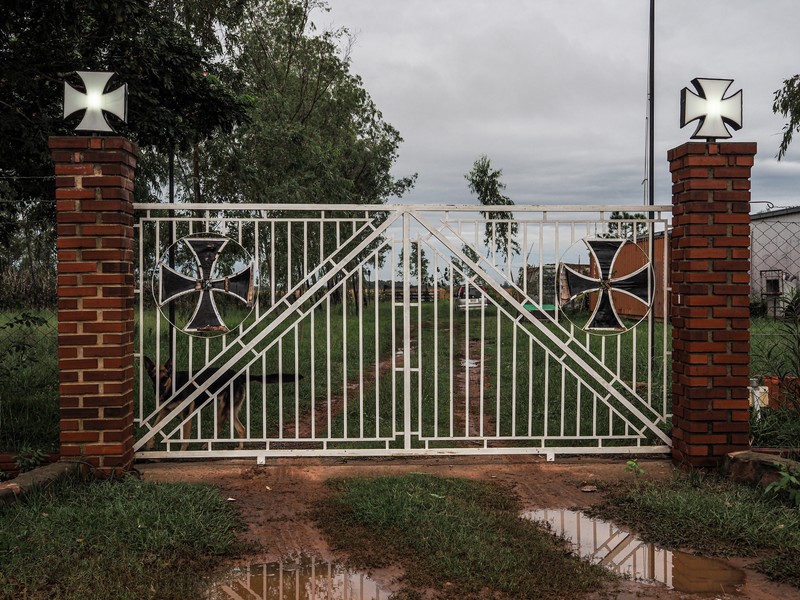 |
| A GERMAN SHEPHERD PEERS OUT FROM A METAL GATE ADORNED WITH THE IRON CROSS SYMBOL IN INDEPENDENCIA, A PARAGUAYAN TOWN WHERE THE FIRST NAZI PARTY OUTSIDE OF GERMANY WAS FOUNDED IN 1928. PHOTO: NATHANIEL JANOWITZ FOR VICE WORLD NEWS |
They were encouraged by the fact that, for much of the pandemic, Paraguay did not require proof of vaccination upon entry, even though the country’s death toll continued to rise.
But the arrival of Germans in Paraguay dates back to way before the COVID-19 wave began. In 1887, a group of German antisemites moved to Paraguay with the goal of creating an Aryan paradise amid the harsh terrain. It didn’t work, but it helped lay the foundations that established Paraguay as a land of escape for Germans, including Nazis fleeing here after World War II—notably the Nazi doctor Josef Mengele, known as the Angel of Death for his deadly experiments at concentration camps—and now the German anti-vaxxers.
Today, there are officially some 7,730 German ex-pats living in Paraguay, but the German consul there told local media that the number is estimated at somewhere between 22,000 and 30,000 if you include those without proper paperwork. Over 1,600 Germans formally moved to Paraguay in 2021, triple the number who moved there the year before. The country is currently on pace to receive over 2,000 German immigrants in 2022, and they now represent the largest group of ex-pats living in Paraguay, after Brazilians and Argentines.
The flood of German anti-vaxxers, along with similar-minded ex-pats from around the world, hasn’t gone unnoticed by Paraguayan society, and it’s led to a cavalcade of negative publicity. The public face of that controversy is Paraiso Verde.
The community was founded in 2016 by another German-speaking couple named Erwin and Sylvia Annau. Since then, videos of Erwin Annau railing against Muslims and immigration in Europe have resurfaced in the press, along with details about his previous shady business dealings. But the Annaus see themselves and their new community as a freethinker’s paradise where people can live off the grid and escape Western restrictions.
They’ve come under scrutiny for their close relationship with Paraguay’s political elite, repeatedly meeting with high-profile politicians from the ruling Colorado Party to discuss the official response to the coronavirus. When the vaccine regulations were lifted after three months in mid-April, Erwin Annau claimed victory, posting on the Paraiso Verde website that “Paraguay is free!,” taking credit for the change in legislation, and comparing the group to “Jedi Knights” fighting against a “global ‘omnipotent’ octopus with an unlimited budget.”
“It was a long struggle. 2 years of convincing politicians at state, federal and municipal level, countless hours of research, translation, forwarding the current TRUE information about Covid, tests, masks and vaccination,” Anna wrote.
In an attempt to address the “rumors” surrounding the community, the Paraiso Verde website’s lengthy Q&A page includes the question "Are you a haven for Nazis?"
“No,” they write, before explaining how the “word is abused today in a vile and reprehensible way to ‘push’ those who think differently politically into a ‘corner’. The word Nazi is instrumentalized to force opinion into line with unworldly, extreme left-wing multiculti ideologies.”
Wichmann and her husband, Heinz Kloetzner, are both unvaccinated and said they will never get the shot because the coronavirus is no more than the common flu. Wichmann called the coronavirus vaccine “nonsense” but held back from going into details about why, just saying “follow the money.”
The couple took issue with the recent onslaught of bad press against the community.
“It’s always the same, that we are some strange people,” said Kloetzner. “It isn’t so. I think as many different people as you have in your hometown, it's as many different people as you have here.”
They emphasized that while Germans are the majority, theirs is an international community with people from around Europe, the U.S., Canada, and other parts of the world. They said they host parties where people cook their country’s unique dishes to share. They also claimed that the local community around Caazapá benefited from new jobs at the compound and foreign money being funneled into local businesses.
“This is crazy. It’s a negative campaign to make [Paraiso Verde] bad. We love people. We love natives,” he said. “But what we don't want here is someone who is keen to convert everybody into their thinking. We don’t accept that.”
Kloetzner and Wichmann founded the “umdenken” library in their home, a German word that could be translated as “to rethink,” or as they explained it in English, “to change your thinking if you want a solution.”
It’s filled with books about philosophy, alternative medicine, and healing, they said. When asked about whether there were extremists or racists in Paraiso Verde, they replied that people’s own thoughts are “private.” The central, binding, aspect of Paraiso Verde is that “there is no religion here and nobody is telling you what you should think… everybody can think whatever they want,” said Wichmann.
About 200 miles north of Paraiso Verde, Wilfried Fischer rode his horse down a dusty, amber-colored dirt road, surrounded by vast fields and brush as far as the eye could see. In much of the South American nation, Fischer’s pale skin, graying-blond hair, and blue eyes could suggest that he’s one of the wave of European immigrants recently flocking to Paraguay. But not here in Nueva Germania—New Germany—a rural outpost that’s a remnant of one of the greatest failures in human history.
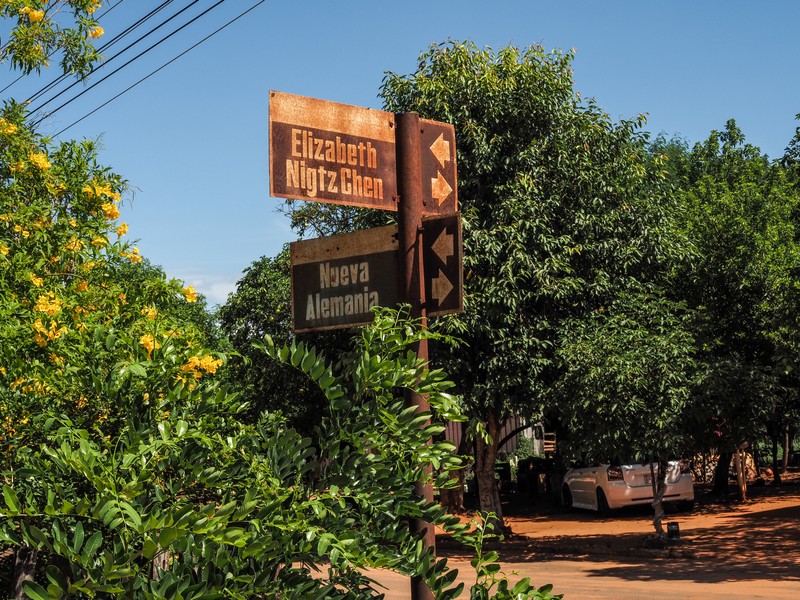 |
| ELIZABETH NIGHTZ CHEN STREET IS NAMED AFTER NUEVA GERMANIA'S COFOUNDER, ELISABETH NIETZSCHE, BUT IT WAS SPELLED INCORRECTLY AND NEVER FIXED. PHOTO: NATHANIEL JANOWITZ FOR VICE WORLD NEWS |
Bernhard Förster, a well-known writer and leader in Germany’s 19th century anti-Jewish movement, chose Paraguay to found a community of German antisemites in 1887. At the time, it was easy to buy large plots of rural land. But the project didn’t fulfill his vision, and he committed suicide two years later. His wife, Elisabeth Nietzsche—the sister of the famed German philosopher Friedrich Nietzsche—returned to Europe and became an early supporter of Adolf Hitler and the burgeoning Nazi party before her death in 1935. Many of those who remained intermarried with locals for generations, so that much of the European-looking townsfolk speak both German and the indigenous Guaraní language.
While the Fischer clan descends from one of the 14 initial families who arrived to pursue Förster’s Aryan dream, Wilfried told VICE World News that he considers the history and prejudices of his ancestors irrelevant. “Truthfully, I know very little… I’m not interested in the history of Nueva Germania,” he said. “I feel more Paraguayan than German.”
Wilfried’s cousin, Sara Fischer, sat on the front porch of her family's isolated farmhouse a few miles outside of Nueva Germania next to her Volkswagen car. She expressed concern about the rise of Germans and other Europeans arriving in Paraguay because “a lot of people died here.”
The country of only around 7 million people hasn’t been spared the ravages of COVID. Nearly 19,000 Paraguayans died from the coronavirus and less than 50 percent of the population had received the double vaccine doses as of March. Per capita, Paraguay ranks in the top 30 of most COVID-related deaths globally.
As in other towns in the countryside, many residents of Nueva Germania resisted getting the vaccine due to a general distrust of anything being promoted by the federal government. Sara’s elderly father ended up in the hospital from COVID, but he survived. Many of her neighbors weren’t so lucky. After the close call, much of her family is now vaccinated.
Sara didn’t believe that the immigration of Europeans was a bad thing for Paraguay, a decent-sized country with a relatively small population, because “there is room for so many people.”
“But you also need order. You have to know if the Europeans who are coming are healthy or not.”
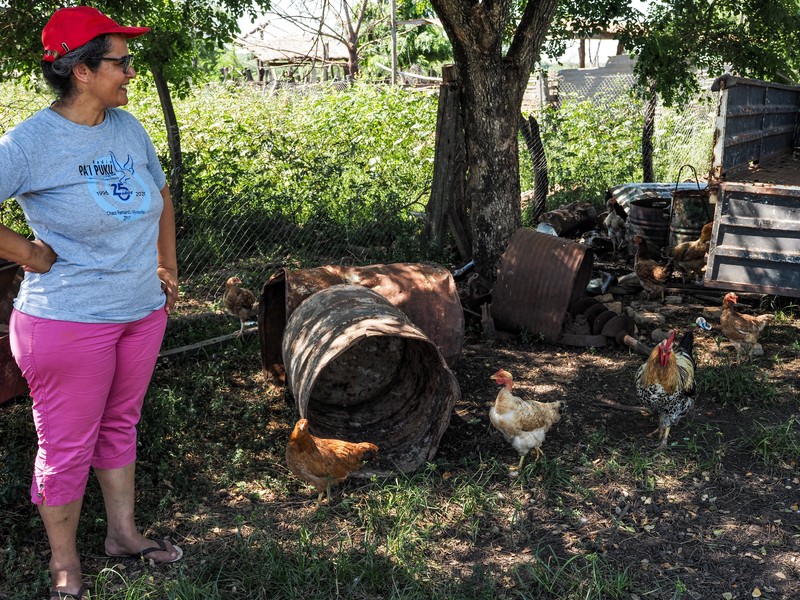 |
| SARA FISCHER'S FAMILY LIVED ON THIS PLOT OF LAND OUTSIDE OF NUEVA GERMANIA FOR GENERATIONS BUT OUTLAWED GERMANS IN THE HOUSE. PHOTO: NATHANIEL JANOWITZ FOR VICE WORLD NEWS |
The government’s not requiring proof of vaccination upon entry for much of the pandemic gave the landlocked nation a good reputation among anti-vaxxers, which angered many locals. But in January, the government started requiring vaccination, outraging many ex-pats. The plight of a family of 17 unvaxxed Germans (including 12 children) went viral after they were denied entry in March, held in the airport for days, then eventually deported.
But unlike her cousin Wilfried, Sara doesn’t speak German. Her side of the family outlawed the language generations ago when her German grandfather married a Paraguayan and her grandmother “decided to root out the German language in her house, or else Grandpa’s relatives are going to come and speak badly about his wife in her own presence.”
Sara admitted that even the idea of speaking German “repulses me a bit” because of its racist origins in the region. “I am very dark-skinned, I am the disappointment of Förster,” she said sardonically.
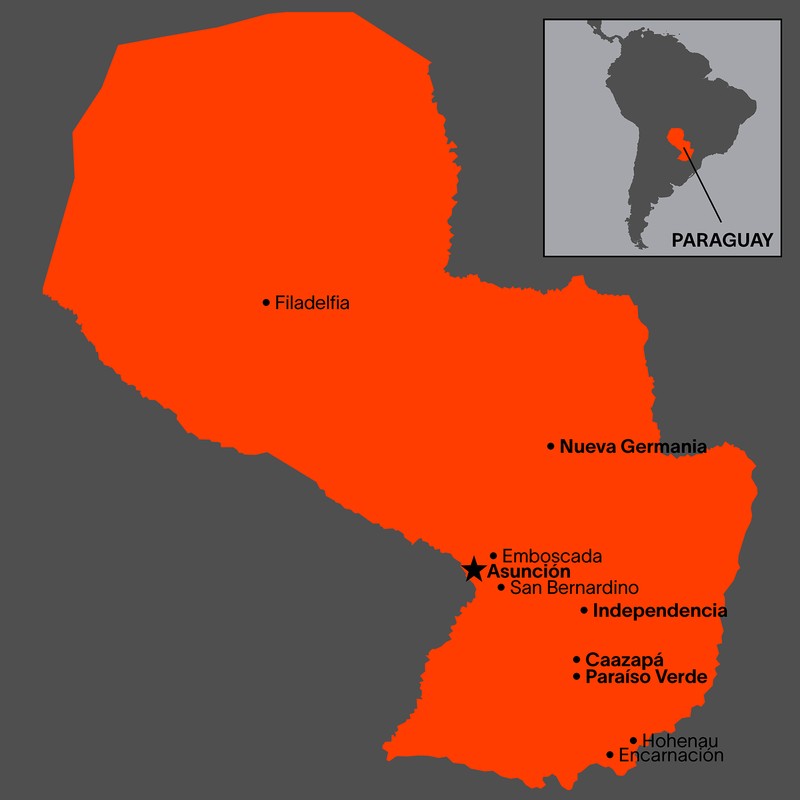 |
SEVERAL CITIES AND TOWNS IN PARAGUAY HAVE DEEP ROOTS IN GERMANY DATING BACK GENERATIONS. MAP: CATHRYN VIRGINIA FOR VICE WORLD NEWS |
But while Förster’s dream of an Aryan paradise in Paraguay failed, it helped forge a connection between the two countries that would eventually turn it into a backwater refuge for not just anti-vaxxers today, but runaway Nazis during the 20th Century.
The first branch of the Nazi party outside of Germany was founded in Paraguay in 1928 in an area around a town called Independencia, after World War I, by a group of former German military men. The area later became popular with Nazis escaping post-war Europe. VICE World News found the Iron Cross decoration given by the German military, including the Nazis, on several graves in the German cemetery outside of Independencia and on an imposing gate outside a farmhouse in the countryside.
Paraguay’s reputation as a safe space for Nazis is largely credited to Alfredo Stroessner, a young half-German general who rose to power in 1954 and led the South American nation for 45 years as a brutal dictator. Stroessner, whose father immigrated to Paraguay a few decades earlier, was widely considered to be a Nazi sympathizer.
“[Stroessner]’s the style of dressing, of behaving, the way his military career played out. He was clearly a Nazi,” said Andrés Colmán, a prominent local journalist and author of a book about Josef Mengele’s escape to Paraguay. “Only when the war ended and he had to become an ally of the U.S. did he somewhat disguise his Nazism.”
 |
A GROUP OF INVESTIGATORS BELIEVE THAT ADOLF HITLER IS BURIED UNDER THE GARDEN OF HOTEL PALMAS DEL SOL IN DOWNTOWN ASUNCIÓN, BUT ITS GERMAN OWNER WON'T LET THEM LOOK. PHOTO: NATHANIEL JANOWITZ FOR VICE WORLD NEWS |
During Stroessner’s dictatorship, numerous Nazis were known to have hidden in the country while a former Nazi pilot named Hans-Ulrich Rudel became one of his trusted advisers. Notorious Nazi doctor Mengele received Paraguayan citizenship in 1959 as “José Mengele” before going on the run in Brazil when his whereabouts became known by Nazi hunters, and Eduard Roschmann, the “Butcher of Riga,” died in Paraguay in 1977. But many lesser-known Nazis are believed to have lived out their final years away from prosecution in freedom in Paraguay. There’s even a theory under investigation that Adolf Hitler is buried under a hotel garden in Asunción. The hotel’s German owner did not respond to VICE World News’ request for comment.
When Stroessner’s dictatorship finally fell in 1989, it didn’t create a true democracy. His conservative Colorado Party further institutionalized itself and has remained in power almost continually ever since with several rich and powerful Paraguayans coming from German origins. It’s believed that around 300,000 of Paraguay’s population of 7 million have German roots.
“Paraguay is a community where the majority of people are conservative, right-wing. People who admire Hitler, envy Stroessner, admire dictators, Pinochet, and Trump. The land is fertile for these German groups to come,” said Colmán.
The ugly underbelly of some aspects of German society made international headlines when a 7-year-old Paraguayan girl disappeared on April 15, 2020, and her stepfather, a German immigrant named Reiner Oberüber, was arrested.
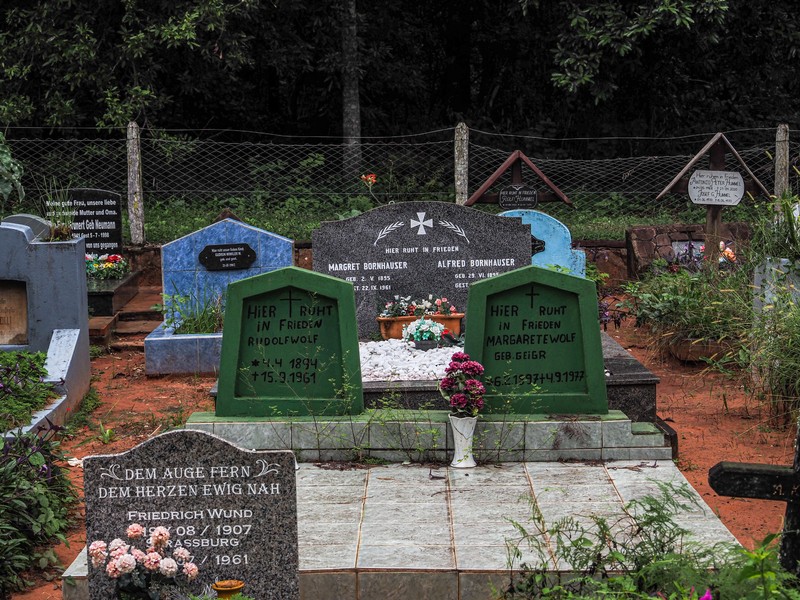 |
NUMEROUS GRAVES AT A GERMAN CEMETERY IN INDEPENDENCIA WERE ENGRAVED WITH THE IRON CROSS SYMBOL. PHOTO: NATHANIEL JANOWITZ FOR VICE WORLD NEWS |
Oberüber is a well-known figure in the controversial Reichsbürger movement who maintains that the German Reich still exists within its pre-World War II borders and that the modern German republic is illegitimate. The movement continues to be far-right instigators involved in some of Germany's most infamous recent radical anti-vaccine conspiracies, including a plot to kidnap Germany’s health minister that was foiled by authorities on April 13. Oberüber was eventually cleared of abducting his stepdaughter, but the investigation led to the discovery of another German-owned house with an antique gun collection that had Illuminati imagery painted over the entranceway.
Back in the original paradise lost, Nueva Germania, Clara Kück, and her family still speak mostly German. Kück said that the flood of anti-vaxxers arriving in Paraguay “hurts me” because “the pandemic was something that affected us all, [Paraguay] suffered a lot.”
“We are all trying to convince people to get vaccinated and a group of people arrive who are totally against it and [the government] gives them asylum,” said Kück. “Even if they come from Germany, I disagree.”
But she also thought that “in the long run, it's not going to work for [isolated communities].”
As the pandemic lulls, the number of new German anti-vaxxers arriving in Paraguay is likely to lessen. Whether their communities and those of other Germans here will thrive the way their original founders intended remains uncertain.
Santi Carneri contributed to this report.
Comments